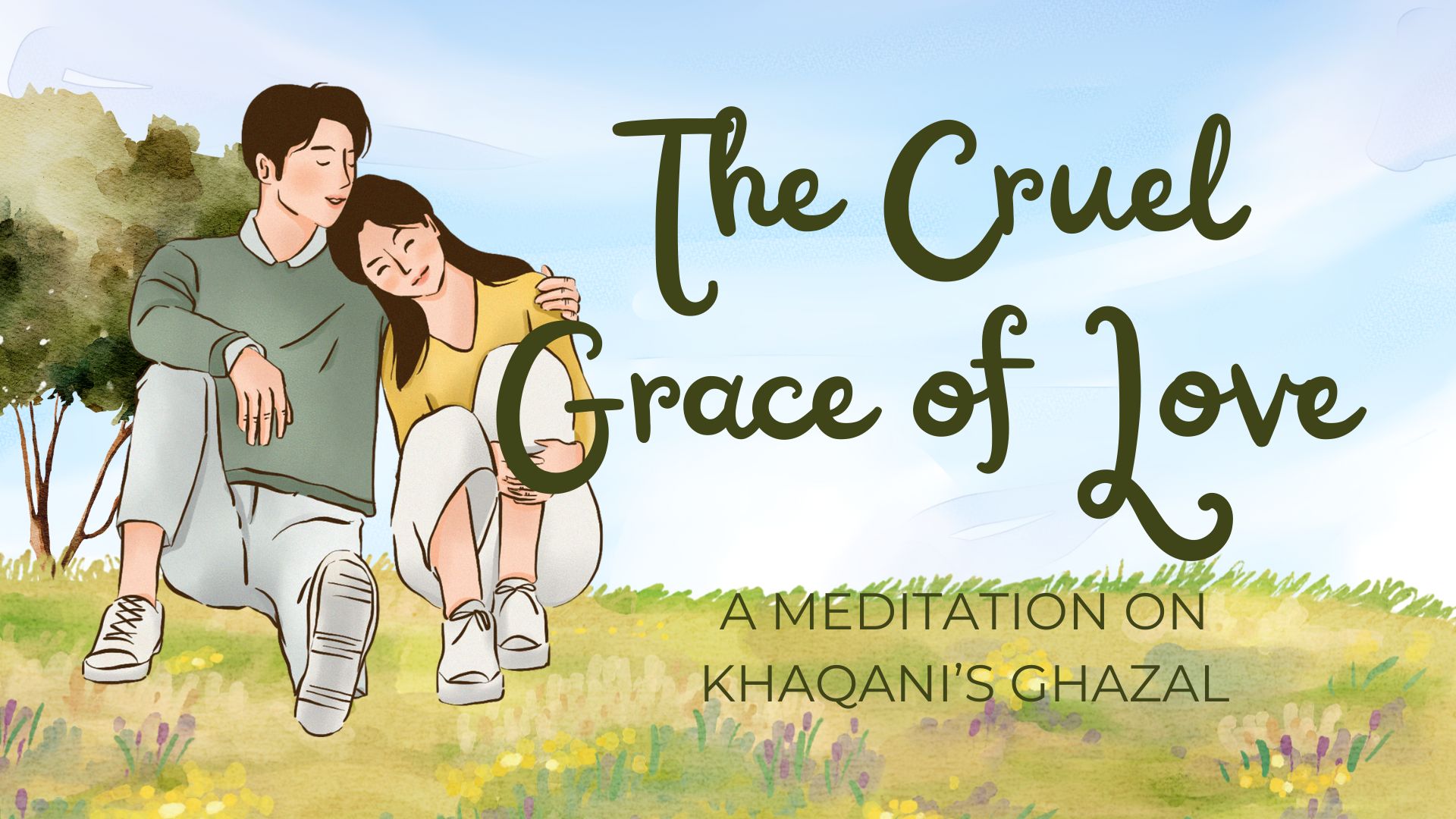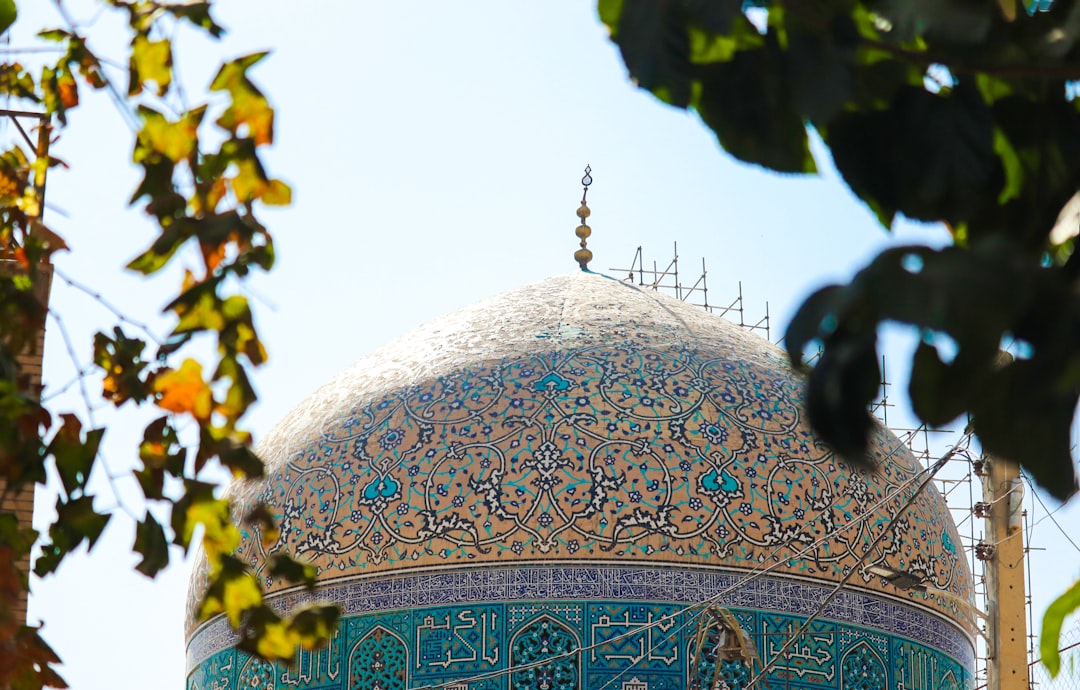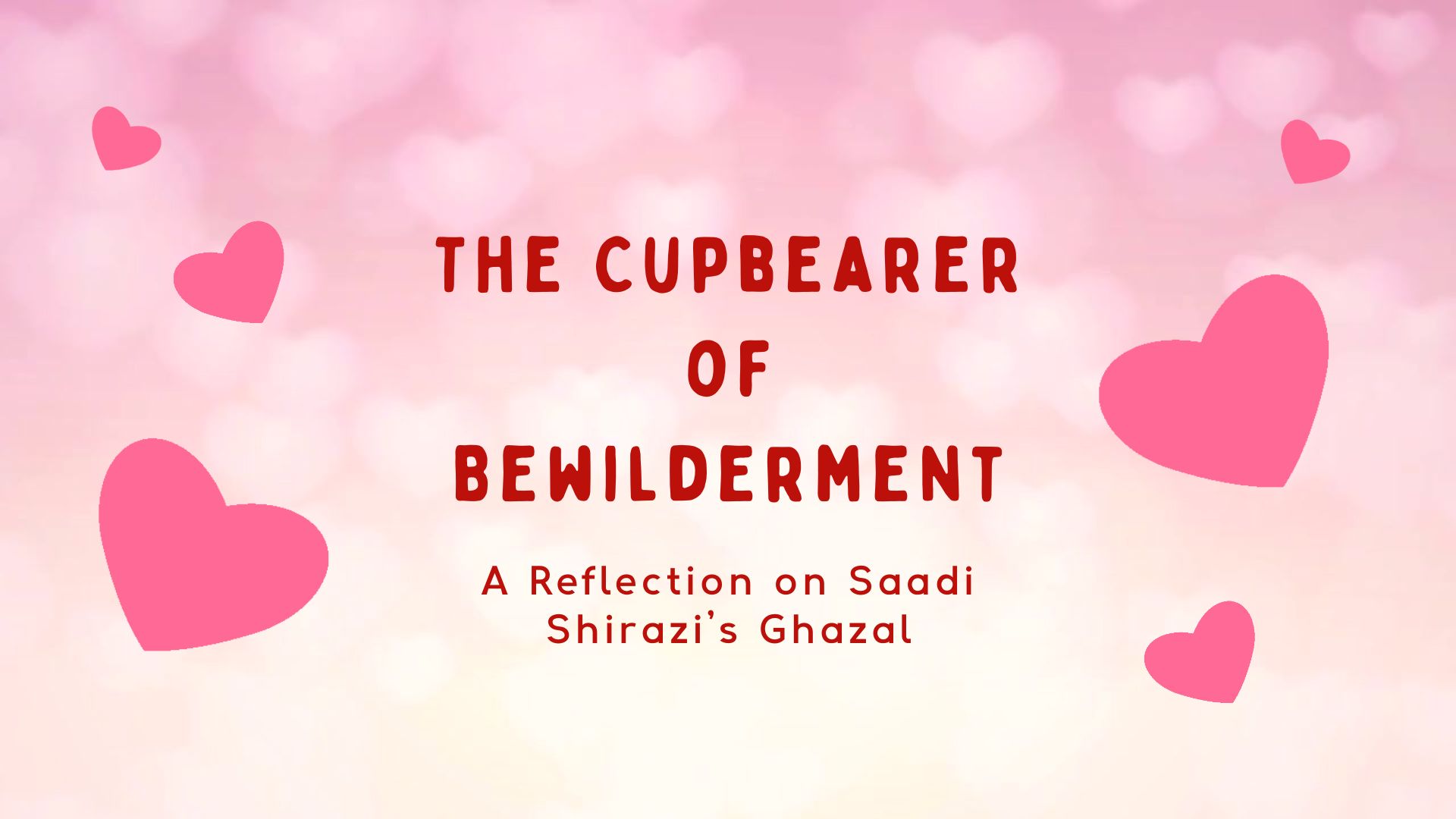This ghazal by Khaqani Shirvani is among his most poignant reflections on unrequited love, the cruelty of beauty, and the paradox of longing. It lives between human emotion and spiritual symbolism; a cry of the heart that becomes a meditation on the mystery of affection and pain.
طبعِ تو دمساز نیست عاشقِ دلسوز را
خویِ تو یاریگر است یارِ بدآموز را
دستخوشِ تو منم، دستِ جفا برگشای
بر دلِ من بَرگُمار تیرِ جگردوز را
از پیِ آن را که شب پردهٔ رازِ من است
خواهم کز دودِ دل پرده کنم روز را
لیک ز بیمِ رقیب وز پیِ نفیِ گمان
راهِ برون بستهام، آهِ درونسوز را
دل چه شناسد که چیست قیمتِ سودایِ تو؟
قَدْر چه داند صدف دُرِّ شبافروز را؟
گر اثرِ رویِ تو، سویِ گلستان رسد
بادِ صبا رد کند تحفهٔ نوروز را
تا دلِ «خاقانی» است از تو همی نگذرد
بو که درآرد به مهر آن دلِ کینتوز را
English translation of Khaqani Shirvani’s ghazal:
Your nature finds no harmony with the tender-hearted lover,
Your disposition is a friend only to the false and the faithless.
I am in your hands; open the hand of cruelty,
And aim upon my heart the arrow that pierces the soul.
For the one who guards my secret in the night,
I wish to lift the veil by day with the smoke of my burning heart.
Yet, for fear of the rival and to silence suspicion,
I have closed the outward path, leaving only the sighs that burn within.
How could the heart ever know the worth of your passion?
How could the shell comprehend the value of the night-glowing pearl?
If the radiance of your face should reach the garden,
The morning breeze would scorn the gift of Nowruz.
As long as Khaqani’s heart belongs to you, it shall not turn away
Perhaps your vengeful heart will one day awaken to love.
There are loves that heal, and loves that wound; loves that open the heart to joy, and loves that break it until it becomes something more than flesh, more than sorrow, more than itself.
Khaqani Shirvani, the poet of grandeur and grief, lived at the edge of that mystery. His verses burn with both pride and pain; the cry of a soul too vast for comfort, too sincere for disguise. In this ghazal, he speaks not only as a man betrayed by affection but as a spirit struggling with the contradictions of love itself: mercy and cruelty, nearness and distance, devotion and disdain.
The Lover and the Unyielding Heart
"Your nature is no companion to the tender-hearted lover;
Your temperament is the ally of the false and faithless."
So begins the lament. There is no pretense here; the poet speaks to a beloved who is beautiful but unkind, radiant yet cold. The lover’s heart is gentle, faithful, consumed by devotion. But the beloved; proud, capricious; befriends only those who do not love deeply, who play at affection without burning in it.
This is one of love’s cruel truths: sometimes the heart that feels most purely is the least desired. The world often favors charm over depth, surface over sincerity. The tender-hearted lover, who trembles in truth, is left unheard. The false beloved prefers the company of flatterers and deceivers.
And yet, even as Khaqani reproaches, his tone reveals that strange paradox every true lover knows; that the beloved’s cruelty does not lessen love; it sharpens it. To be rejected by beauty only confirms beauty’s power. The wound becomes proof of devotion.
It is as though love demands injustice; for only through the beloved’s indifference does the lover’s fidelity reveal its depth.
The Tyranny of Beauty
"I am in your hands — open the hand of cruelty.
Aim your heart-piercing arrow upon my heart."
In these lines, the lover surrenders completely. He does not ask for mercy, but for a wound. To love one who will not love you back is to long for pain; not because one enjoys suffering, but because pain is the last proof of nearness. The beloved may not grant affection, but if she wounds you, she at least acknowledges your existence.
This is the secret logic of the mystic’s heart. The arrow is love itself; it enters the heart and transforms it. In being pierced, the lover becomes transparent; his ego dissolves, his voice becomes a vessel for something higher.
Every wound, in this way, is an initiation. The heart that bleeds learns the language of silence. The lover becomes a poet; or perhaps more accurately, poetry itself.
So Khaqani’s plea is not for the end of suffering, but for the perfection of it. He says, “If you must wound me, wound me fully. Do not leave me half-alive.” For there is something unbearable about half-love; it neither kills nor redeems. The complete wound, on the other hand, frees the soul from its human cage.
The Veil of Secrecy
"For the one who is the guardian of my secret by night,
I wish to lift the veil by day through the smoke of my heart."
Here, Khaqani reveals another layer; the tension between concealment and revelation. The beloved is the keeper of his secret, the one who holds his heart’s mystery. By night, love lives in silence and shadows; but by day, the poet longs to express it, to let the world see what burns within.
And yet, he cannot. The next verse confesses why.
"But from fear of the rival, and to silence suspicion,
I have closed the outer path, leaving only the inner sighs to burn."
How perfectly this captures the loneliness of love that must remain hidden. The lover cannot speak, cannot approach, cannot show his devotion; the world would mock, the rivals would interfere, the beloved might turn further away. So he keeps his passion within, feeding it with breath, keeping it alive through sighs.
The outer road is blocked, but the inner one remains; a path paved with tears, dreams, and silence.
And in that inwardness, something profound happens.
Love turns inward and becomes contemplation.
Every secret unspoken becomes prayer. Every sigh turns into light.
This is how unfulfilled love matures into wisdom. It ceases to chase and begins to behold. The beloved, once a person, becomes a presence that lives within the heart’s chamber. Love no longer depends on proximity; it becomes being itself.
The Price of Longing
"How can the heart know the worth of your passion?
How can the shell comprehend the value of the pearl that glows at night?"
Here, Khaqani speaks not only to the beloved, but to the world. The world; ordinary, shallow, occupied with trifles; cannot understand the magnitude of true love. Only the lover knows what it costs to carry such fire.
The heart, even the lover’s heart, cannot fully grasp its own treasure. Just as the rough shell does not know what brilliance it hides, the human heart, in its fragility, cannot measure the infinite depth of its devotion.
We often think we love until pain comes. But it is pain that reveals what love truly is. The pearl is born from the wound of the shell; longing is the same. It polishes the soul until it glows in the dark.
To love deeply is to become both the shell and the pearl; to suffer and to shine, to be wounded and to illuminate.
When Beauty Surpasses Spring
"If the radiance of your face reaches the garden,
The morning breeze will scorn the gift of Nowruz."
Nowruz, the Persian New Year, symbolizes renewal, life, fragrance, and the joy of spring. Yet Khaqani declares that even the dawn wind, the sabā, that carries the perfume of flowers, would feel ashamed in the presence of the beloved’s beauty.
This is not mere flattery. It is the poet’s way of saying that the beloved’s presence redefines the meaning of beauty itself.
For the lover, the natural world its seasons, its blossoms, its music, pales beside the face of the one he adores. When love awakens, everything in creation seems to take its meaning from the beloved. Every light becomes a reflection, every breeze a whisper of that single presence.
In this sense, the beloved is not only a person, but the embodiment of the world’s secret harmony, the mirror through which the divine beauty becomes visible.
When Khaqani says that the breeze would reject its own gift, he is saying that love transforms all values. What once seemed radiant now feels dim beside the flame of devotion.
Such is the alchemy of the heart: it replaces the world’s standards with its own. It teaches us that beauty is not in form but in affection, not in what we see, but in how we see.
The Faithful Heart
"As long as Khaqani’s heart belongs to you, it shall not turn away.
Perhaps your heart of malice will one day yield to love."
This final couplet breathes both pain and hope, a closing whisper of faith in the face of despair.
The lover declares his constancy: he will not withdraw his heart, no matter the rejection, no matter the cruelty. His love is not a contract but a vow, a silent, eternal promise.
And yet, there is also a subtle prayer: “Maybe, someday, your heart will soften. Maybe love will awaken in you, too.”
There is no demand, no anger left, only endurance.
This is what love becomes at its highest stage: patience without expectation.
The lover no longer asks to be loved; he asks only to keep loving.
Khaqani, who lived a life full of bitterness, betrayal, and exile, understood this truth deeply. His poetry often bears the weight of loneliness, yet within it glows an unwavering flame, the certainty that love, though painful, is the soul’s most authentic expression.
The Journey Through Wound and Wonder
When we read this ghazal as a whole, we can feel its movement, from reproach to surrender, from outward pain to inward illumination.
It begins with complaint: “Your nature is harsh, your favor misplaced.”
It ends with faith: “My heart will not turn away.”
Between those two poles lies the entire journey of love, from the first wound to the final awakening.
This is why Persian poetry remains timeless. Beneath its metaphors of lovers and rivals, gardens and arrows, there is a universal map of the human soul. Each verse is a mirror showing us our own struggles: to love without return, to hope without reason, to remain faithful when the world seems indifferent.
And yet, in the act of loving, even unreturned, something divine stirs.
Love teaches us to see beyond the surface of things, to find meaning in pain, purpose in loss, beauty in impermanence.
The Hidden Fire
When Khaqani says he has “closed the outer path” and kept only “the inward sigh,” he is describing what every deep soul eventually learns, that love’s greatest truths unfold not in the world of action, but in the inner realm of being.
There is a fire that burns without smoke, a prayer that needs no words. The sigh, that quiet release of the heart, becomes the essence of worship.
In the mystic tradition, the sigh (āh) is sacred. It is the soul’s way of speaking to the unseen. It carries both pain and purity, both loss and longing. The more silent the lover becomes outwardly, the more eloquent his inner voice grows.
Thus, what begins as heartbreak becomes meditation.
What begins as desire becomes remembrance.
And what begins as a wound becomes a doorway.
The Divine Shadow
While Khaqani’s beloved may seem human, a figure of beauty and cruelty, in truth, she is also a shadow of the Divine. In Persian mysticism, the beloved’s indifference is not mere rejection; it is a reflection of the world’s mystery, the way the Infinite hides itself, inviting the soul to seek, to burn, to awaken.
Just as the poet’s heart cannot comprehend the “price of the pearl,” we cannot fully understand why love wounds us.
But perhaps the wound is not punishment, it is initiation.
To love and to lose is to be introduced to the sacred rhythm of existence, the ebb and flow, the closeness and distance, the fire and the silence.
Through such love, the soul learns what it could not learn in comfort: humility, depth, surrender.
Beyond Desire
In the final lines, Khaqani’s endurance, his refusal to turn away, marks the end of desire and the beginning of devotion.
Desire wants possession. Devotion wants only presence.
Desire says, “Love me.”
Devotion says, “Let me love you, no matter the cost.”
The lover who reaches this stage has crossed from human passion into spiritual maturity. He no longer seeks fulfillment from another; he finds meaning in the act of loving itself.
In that act, the self dissolves, and something eternal awakens, what the mystics call ishq-e haqiqi, true love.
What the Heart Learns
Every verse of this ghazal contains a lesson written in the ink of longing:
-
Love is not fair. It chooses whom it will wound.
-
Suffering is not meaningless. It deepens the heart’s capacity for truth.
-
Silence is not emptiness. It is where the soul begins to speak.
-
Faithfulness, even unreturned, is holy. It reveals love’s real power, endurance.
And perhaps the most important lesson:
Beauty is not in the beloved alone, but in the lover’s gaze.
The beloved may never change, may remain distant, proud, cold.
But through the act of loving, the lover becomes luminous.
That is the transformation at the core of Khaqani’s poetry: love does not always lead to union, but it always leads to awakening.
The Heart’s Final Word
What remains, when all desire has burned away?
What remains when the outer path is closed, when the rivals laugh, when even the beloved turns her face away?
Only this: the pure act of loving.
Silent, steadfast, selfless.
It is this love that survives time, distance, even death.
It is this love that makes poets of the broken, and saints of the sorrowful.
Khaqani’s voice, echoing across centuries, reminds us that to love and to suffer is not failure, it is the very proof of life.
And so, like him, we too may whisper:
“As long as my heart belongs to love, it will not turn away.
Perhaps one day, even the heart of cruelty will remember its own tenderness.”





